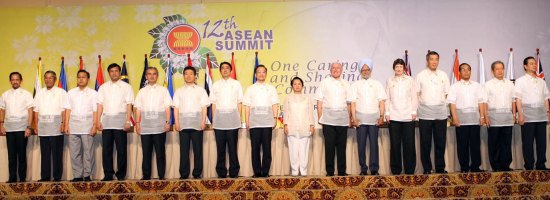(Admittedly, this post is several days late; I blame family.)

So the East Asia Summit for 2006 (er, 2007? 06-07? or something?) has drawn to a close, and although the institution is still new and finding its feet, this year has presented a few good signs that the Summit will have a successful future in encouraging regional cooperation.
Aside from several measures to promote regional trade, the big announcement was a declaration that promises cooperation on “energy security”, which is to say there’ll be a big push for investment in transmission and generation infrastructure. Assuming the declaration is followed through, there’ll also be a few token measures towards bio-fuels and renewable energy (though admittedly that’s better than nothing).
I think it’s illustrative that our local daily gave a big chunk of space on the business pages to an AP story about the energy pact, which seems to mirror several other news services I’ve checked. In other words, talk of energy deals makes business leaders (or at least business press editors) stand up and take notice — which, if nothing else, has the benefit of giving the Summit some more widespread attention than it’d otherwise earn. On that front, the EAS has already done better than APEC meetings of recent years, none of which have produced anything quite as noteworthy.
Within that context, the Japanese government has already stepped forward with a donation of US$2b for energy research, yet another component in its long-term programme of being the region’s aid financier. Similarly, the AusAID announcement earlier in the week of $5m to combat bird flu was soundly trounced by a Japanese pledge of an additional US$67m. These donations are important in the sense that they’re giving substance to the decisions being made at the EAS — which suggests that to some extent, the EAS is already getting things done. (On the other hand, though, Japan was donating money for disease prevention long before 2005.)
Speaking of Japan, simmering resentment between it and China earned barely a mention in most media coverage of the second Summit — unlike last time — and this is pretty much entirely due to Shinzo Abe taking over from Junichiro Koizumi as PM. Abe has made little in the way of significant changes to Japan’s dealings with China, but simply by not visiting the Yasukuni Shrine (as PM) he has defused tensions enough that an entire section of my thesis is rendered obsolete. But that’s a good thing, because I argued that a rift between the region’s largest economies was the single biggest issue in the way of a successful EAS.
Interestingly, Russia wasn’t at the table this time around, even though its presence would have actually been relevant on the question of oil supply (so I suppose that ends the speculation from 2005 about whether it’d become a fully-fledged member!).
The broader ASEAN Summit (of which the EAS was one part) earned headlines for a declaration about terrorism and progress towards an ASEAN Charter, but otherwise there was little reaction to the events of the last 12 months. It is the ASEAN Way to not criticise any country’s domestic affairs in public, so there was nary a whimper about the fact that Thailand was represented by a military general. North Korea and Myanmar were both told off, the former about the 6-party talks and the latter for lacking democracy, but these announcements have become yearly stalwarts. Beyond that, the only announcement that struck me as interesting was the plan for new university courses as part of the cultural component of the forthcoming ASEAN Community.
As a final note, the most prominent mention that the Summit got in Australia was John Howard’s stopover in Broome on the way back. Frankly, were I in his shoes, I’d probably do the same — although I’d have covered my back for the inevitable “who paid for this?” squabbles 




 Atom feed
Atom feed

